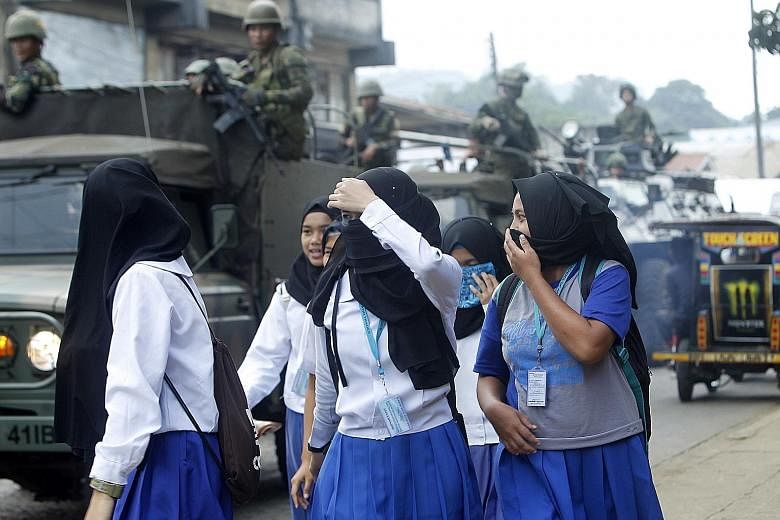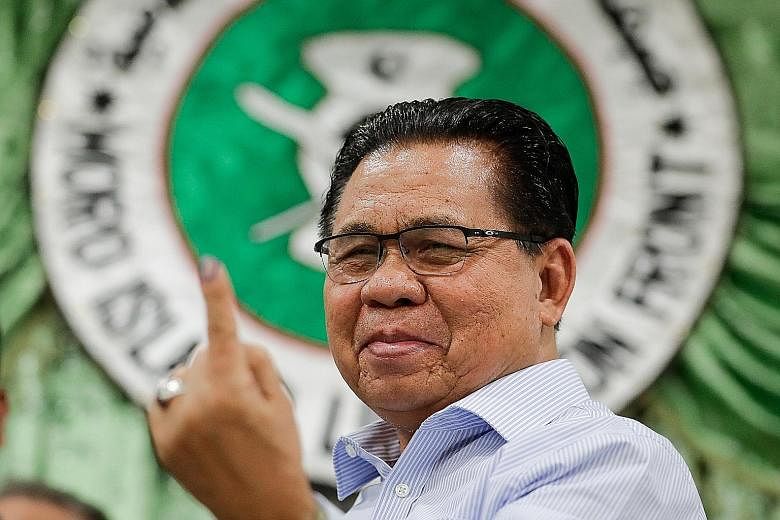MANILA • Voters have decisively approved a new Muslim-led region in the Philippines' south, which is hoped will bring a measure of peace after decades of fighting killed thousands and mired the area in poverty.
The results, announced yesterday, will begin the process of the Catholic-majority nation's largest rebel group, the Moro Islamic Liberation Front (MILF), laying down its weapons and assuming political power.
About 150,000 people were killed in the rebellion that began in 1970s and aimed to push the government to grant independence to a Muslim minority concentrated on the southern island of Mindanao.
"We are very happy about the overwhelming support of the people," said MILF leader Murad Ebrahim. "It was a landslide. There's been nothing like this."
Voters, who were expected to back the so-called Bangsamoro region, delivered a convincing result of about 1.7 million in favour and about 254,600 against, according to official results from the Philippines elections commission.
A handful of smaller areas, which were not included in Monday's referendum due to administrative delays, are set to vote on Feb 6 on whether to join.
Rebels and the government in Manila hope a new peaceful Bangsamoro will finally draw the investment needed to pull the region from the brutal poverty that makes it a hot spot for radical recruitment.
As part of the peace process, the MILF has joined the government in battling the hardline factions aligned to terror group Islamic State in Iraq and Syria (ISIS) waging guerilla campaigns in the southern Philippines.
President Rodrigo Duterte, himself from Mindanao, has been a staunch supporter of Bangsamoro and signed the law last year paving the way for the vote.
Under the terms of the law which lays out the region's powers, Bangsamoro will get US$950 million (S$1.29 billion) in development funds over the next 10 years, as well as a chunk of the tax revenue generated within its borders and national receipts.
Manila will keep control over the police, but it is hoped that close cooperation on security with Bangsamoro's leaders will help get a handle on the region's endemic lawlessness.
Muslim rebels have long been battling for independence or autonomy on Mindanao, which they regard as their ancestral homeland dating back to when Arab traders arrived there in the 13th century.
The Bangsamoro region will expand and supersede an existing Muslim-led region which struggled to govern effectively due to limited powers and was hamstrung by alleged corruption.
After voters' approval, the rebels are to immediately demobilise a third of their fighters, which the group said number about 30,000.
MILF has begun an inventory of its weapons, which will not be destroyed but rather placed in a depot guarded by former MILF fighters and government security forces.
Laying down their guns may prove to be a delicate process for rebels living in a region with extremely limited rule of law, where being armed is also a way to protect oneself and family from crime.
Transitioning from rebellion to governance also promises to carry challenges for rebels who have limited experience in the difficulties of politics and bureaucracy.
AGENCE FRANCE-PRESSE


